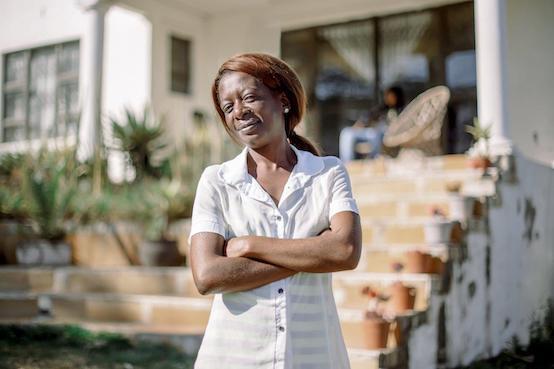Nomcebo Khumalo

|
"I’ve shook hands with death a couple of times. And I’m not going back.”
Crime, violence, prostitution, death, lies, drugs and depression. To most people those words are terrifying, but for me it was normal. I saw nothing wrong with it; it’s all part of umphanto (‘hustle’). I was surrounded by all those things, but they felt more like home than anything else. Until one day…
I’m a 32-year old woman from Mayville. I left home in 2009 when I had a near-death experience. I used to stay with my boyfriend and we both smoked whoonga. In the township when they know you are smoking whoonga you become blamed for every criminal activity that takes place.
One day we were attacked by the community – they beat us up, mob justice style. We were being accused of breaking into someone’s house in the community. While they were beating us up one of the neighbours saw that I knew nothing. She decided to call the police. But by that time, they’ve already beaten my boyfriend to death. That’s when my family decided that they should move me because I was no longer safe at home and as long as I was still there my whole family was definitely not safe. So they decided to send me to Umlazi. But I knew if I went to Umlazi I will start stealing because of my addiction and they will kill me there.
That’s when I decided to go to town and stay there. And I have to say they embraced me with open arms. That seems good but it’s one of the things that make the streets of Durban toxic. When I got to town I stayed at Market Street. I would help the ladies who sell food there for some extra cash. But that was not enough so I decided to go and stay at Addington and hustle by the robots, because I was afraid of prostituting myself. In 2018 I was diagnosed with TB and I took the treatment but for only four months because I thought I was feeling better.
When you are in the streets you acquire different skills of getting money. My skill was to lie: I would tell people that I have TB, even after I finished my treatment; and I would say I have kids at home I have to take care of: in fact I have zero kids. Within these ten years of being in the streets I’ve been in and out of drugs. I couldn’t even bury by own mother when she passed away. That made me want to smoke even more and I’ve seen a lot of crazy things like friends being killed, found the next day with no tongues, no oesophagus and sometimes with no private parts.
But I’ve been clean for 3 months now.
One day I woke up and decided to go to Denis Hurley Centre and ask for help. I got sick again and this time I knew I had to finish the treatment. By December of that very same year I was done with my treatment and clear of TB. And they helped me get through a rehab programme for the first time.
Now I’m back home with my family, happy and now my sister’s kids, who are even taller than me, they call me Aunt: they respect me. I will be going back to school soon, with the hope of eventually being a nurse.
I love helping people.If I ever go back to the streets, the Devil or God might as well take my life. I don’t want to waste my life anymore.
Story update 6 September 2019
Since this story was written, most unfortunately Nomcebo has not been able to stay clean of drugs. We were very saddened to hear from her family that she got back into using heroin and was caught and arrested by the police and is now in Westville prison. Her family are struggling to believe in her and feel very let down. This is a tragedy for Nomcebo, for her family and for us. We pray for them all.
But putting her in prison achieves nothing that is useful for her or society. She will not receive treatment or rehabilitation; she will probably still be able to access drugs (prisons are notoriously porous); she will learn other bad habits; and she is costing the tax payer about R13,500 per month to be kept behind bars (in addition to the cost of the policing and court system that put her there). If the money spent on imprisoning drug users was instead spent on rehabilitating people and reintegrating them into society, it would cost less and at least have the possibility of a positive outcome.
Back to Homeless 101
|